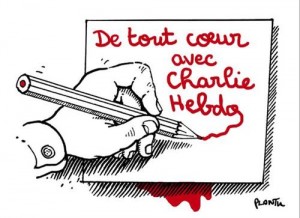Emma-Kate Symons, Quartz, January 7, 2014– The world is rallying around satirical magazine Charlie Hebdo and the French people today, after masked assassins – uttering the prayer “God is Great” and invoking vengeance for the prophet Mohammed – massacred 12 in central Paris.
But the global solidarity with the heroic cartoonists, writers and editors of this struggling weekly publication, targeted and murdered by terrorists during their weekly news conference, and victims of a fire-bomb attack on their office and years of death threats from Islamists, comes far too late.
Charlie Hebdo, which has published on and off since 1969, is proudly anti-organised religion and congenitally politically incorrect.
On a shoestring budget it has been fighting the good fight for freedom of thought and expression and a secular public space for years when many were ambivalent.
For its courage it has run into frequent trouble with local and international Islamofascists, having been forced to move its headquarters several times following threats and a fire bombing, notably after it published an edition in 2011 called “Charia Hebdo”.
Its editors had also annoyed and irritated political leaders in its native France, in Britain, and the United States.
When it bravely republished the infamous Danish cartoons mocking the prophet Mohammed in 2006, even as fundamentalist leaders incited demonstrators to violence around the world, it earned a notorious rebuke from president Jacques Chirac who condemned its “overt provocation“.
As I reported from Paris at the time, then Charlie Hebdo publisher Philippe Val hit back at Chirac, saying he was “shocked” the French head of state would accuse the magazine of inflaming passions.
It is not a provocation. The provocation began well before – the fire was sparked on September 11 in New York, and in the attacks on London and on Madrid.
When there were the attacks on Madrid, on London, did we see the Arab street demonstrating because some assassins had committed horrible crimes in the name of Mohammed? We cannot leave it to religious groups to dictate the laws of freedom of expression.
Some in the Bush administration, wary of violence across the Islamic world, joined in the chorus calling for limits on press freedom. The British foreign secretary Jack Straw deplored newspapers’ “insensitivity and lack of respect”. The elite media in these two countries was also far from unanimous in its support.
Even in Paris over the past week, leading figures in the French fourth estate have been condemning the novelist Michel Houellebecq for allegedly bringing extreme right wing ideas into literature with the publication of his incendiary novel Submission.
The book depicts a France in 2022 governed by an Islamist political party. But Houllebecq is now part of this drama having been featured on the cover of this week’s edition of Charlie Hebdo. So what do editors like Laurent Joffrin at Libération newspaper now have to say? Should the novelist, like the editorial staff at Charlie Hebdo, have held their tongues and their pens?
Horribly, the scene at Charlie Hebdo is worthy of an excerpt from a novel by Houllebecq, and eerily echoes his reading of the Koran: “The obvious conclusion is that the jihadists are bad Muslims … an honest reading will conclude that a holy war of aggression is not generally sanctioned, prayer alone is valid.”
But this is not fiction and it is too easy to dismiss the role of religion and, yes, jihadi prayer in this horror.
France has Europe’s largest Muslim population, rising support for the anti-Islam extreme right, a growing problem with homegrown terrorism, fuelled by hundreds who have fought alongside Islamic State and al-Qaeda in Syria and elsewhere, and also the strongest commitment to the secular separation of church and state of almost any Western democracy.
It has a huge job on its hands trying to manage all its internal conflicts, and the sheer shock and fury this attack has created. This is a tipping point akin to the violence that followed the publication of Salman Rushdie’s Satanic Verses in 1988.
Beyond the immediate political fallout, the “greatest” to emerge from this crime expressly motivated by religious fanaticism are not God, the “avenged” prophet, or Islamist extremism – even if the death cult we associate with IS and Al Qaeda has come to the heart of the city of lights, and the Enlightenment, for centuries a refuge for intellectuals, writers, and artists.
Despite the murderers’ prayers invoking God and Allah, the heroes in this horror are the creative minds of this noble publication. Atheistic agitators, they fought literally to the death for freedom of thought and expression, the liberty to offend, and the right to be iconoclasts.
Their fidelity to the fundamental values of democracy, even as many around the world and in France found their editorial line too “provocative” or “offensive”, will long endure after these killers are brought to justice.
They died as they lived: standing up for their principles, the principles the French first fought for in the 1789 Revolution. Their only “weapons” were their illustrating pens and their words.
The martyred editor-in-chief and beloved illustrator “Charb” said it best in 2012, after years of attacks against his magazine:
I am not afraid of reprisals. I don’t have kids, I don’t have a wife, I don’t have a car, I don’t have credit. This may sound a bit pompous but I would prefer to die standing than to live on my knees.
Read More: Quartz


 Follow
Follow